For the 2025 school year, there are 2 public middle schools serving 1,280 students in Pulaski County School District. This district's average middle testing ranking is 3/10, which is in the bottom 50% of public middle schools in Virginia.
Public Middle Schools in Pulaski County School District have an average math proficiency score of 38% (versus the Virginia public middle school average of 52%), and reading proficiency score of 60% (versus the 70% statewide average).
Minority enrollment is 31% of the student body (majority Black), which is less than the Virginia public middle school average of 53% (majority Black and Hispanic).
Overview
This School District
This State (VA)
# Schools
9 Schools
448 Schools
# Students
4,361 Students
312,714 Students
# Teachers
336 Teachers
23,458 Teachers
Student : Teacher Ratio
13:1
13:1
District Rank
Pulaski County School District, which is ranked within the bottom 50% of all 135 school districts in Virginia (based off of combined math and reading proficiency testing data) for the 2020-2021 school year.
The school district's graduation rate of 90% has increased from 84% over five school years.
Overall District Rank
#88 out of 135 school districts
(Bottom 50%)
(Bottom 50%)
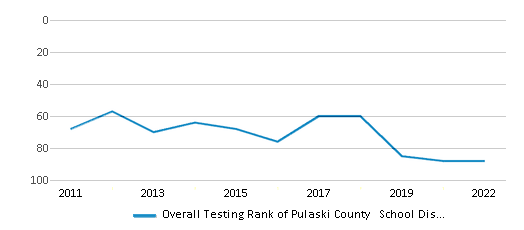
Math Test Scores (% Proficient)
(20-21)48%
54%
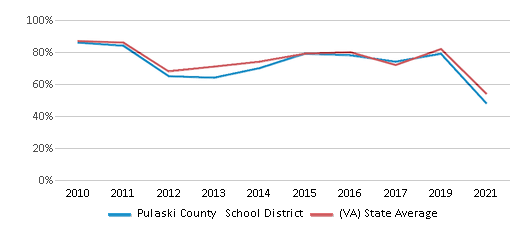
Reading/Language Arts Test Scores (% Proficient)
(20-21)61%
69%
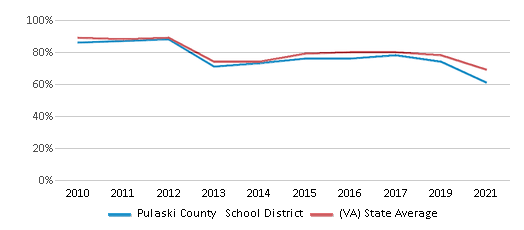
Science Test Scores (% Proficient)
(20-21)52%
59%
Graduation Rate
90%
89%
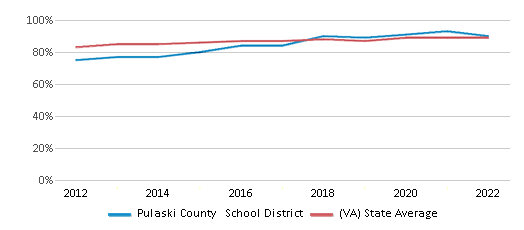
Students by Ethnicity:
Diversity Score
0.38
0.70
# American Indian Students
7 Students
845 Students
% American Indian Students
n/a
n/a
# Asian Students
51 Students
23,246 Students
% Asian Students
1%
7%
# Hispanic Students
183 Students
54,991 Students
% Hispanic Students
4%
18%
# Black Students
330 Students
66,738 Students
% Black Students
8%
21%
# White Students
3,386 Students
145,582 Students
% White Students
78%
47%
# Hawaiian Students
3 Students
525 Students
% Hawaiian Students
n/a
n/a
# Two or more races Students
401 Students
20,787 Students
% of Two or more races Students
9%
7%
Students by Grade:
# Students in PK Grade:
144
1,227
# Students in K Grade:
473
2,557
# Students in 1st Grade:
337
2,554
# Students in 2nd Grade:
330
2,836
# Students in 3rd Grade:
280
3,010
# Students in 4th Grade:
296
3,036
# Students in 5th Grade:
366
4,468
# Students in 6th Grade:
345
78,046
# Students in 7th Grade:
274
93,323
# Students in 8th Grade:
325
93,990
# Students in 9th Grade:
315
7,012
# Students in 10th Grade:
320
7,347
# Students in 11th Grade:
295
6,831
# Students in 12th Grade:
261
6,477
# Ungraded Students:
-
-
District Revenue and Spending
The revenue/student of $12,026 in this school district is less than the state median of $15,502. The school district revenue/student has declined by 8% over four school years.
The school district's spending/student of $11,872 is less than the state median of $15,257. The school district spending/student has declined by 8% over four school years.
Total Revenue
$52 MM
$19,496 MM
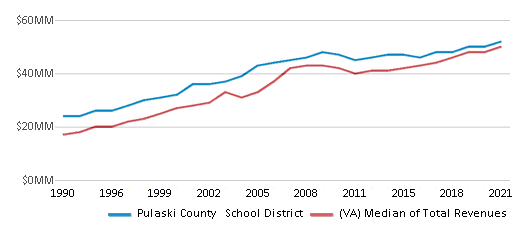
Spending
$52 MM
$19,187 MM
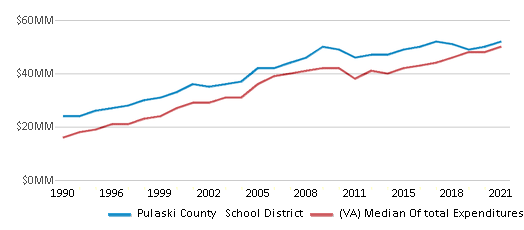
Revenue / Student
$12,026
$15,502
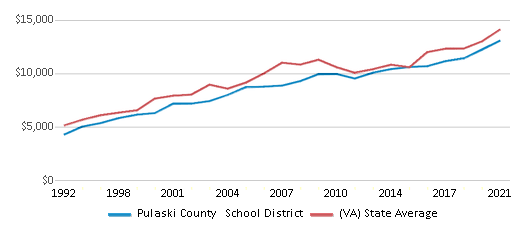
Spending / Student
$11,872
$15,257
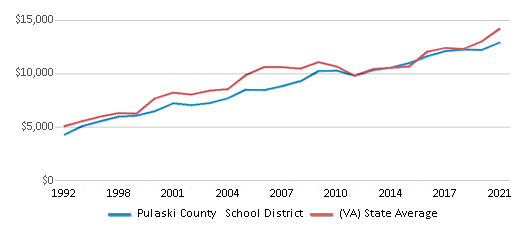
Best Pulaski County School District Public Middle Schools (2025)
School
(Math and Reading Proficiency)
(Math and Reading Proficiency)
Location
Grades
Students
Rank: #11.
Pulaski County Middle School
(Math: 38% | Reading: 60%)
Rank:
Rank:
3/
Bottom 50%10
4396 Lee Highway
Pulaski, VA 24301
(540) 643-0767
Pulaski, VA 24301
(540) 643-0767
Grades: 6-8
| 797 students
202 N. Washington Ave
Pulaski, VA 24301
(540) 994-2519
Pulaski, VA 24301
(540) 994-2519
Grades: K-12
| 483 students
Recent Articles

Year-Round Or Traditional Schedule?
Which is more appropriate for your child? A year-round attendance schedule or traditional schedule? We look at the pros and cons.

Why You Should Encourage Your Child to Join a Sports Team
Participating in team sports has a great many benefits for children, there is no doubt. In this article you will learn what those benefits are.

White Students are Now the Minority in U.S. Public Schools
Increasing birth rates among immigrant families from Asia and Central and South America, combined with lower birth rates among white families, means that for the first time in history, public school students in the United States are majority-minority. This shift in demographics poses difficulties for schools as they work to accommodate children of varying language abilities and socio-economic backgrounds.





